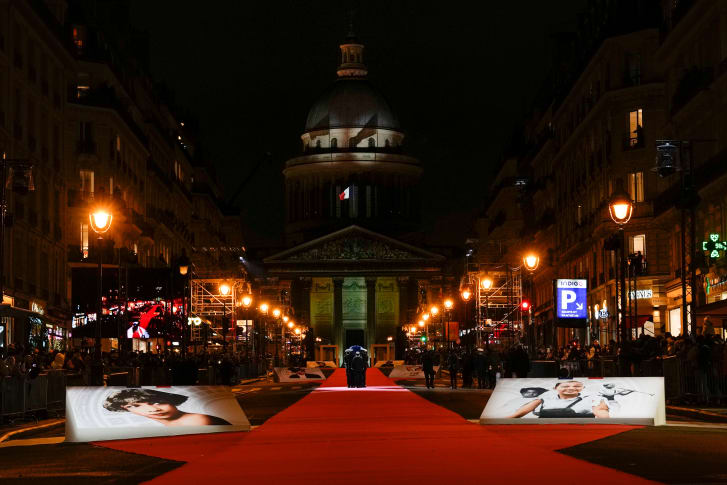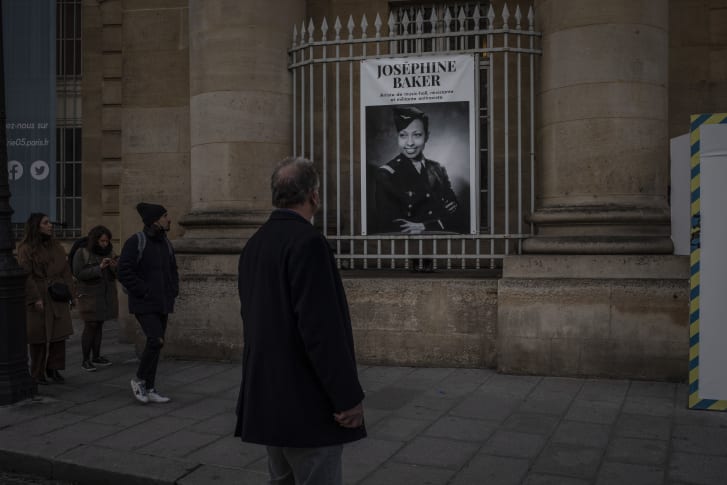
Black, American-born, a woman, and arguably best known for her exotic dancing: Josephine Baker hardly fits the profile of France’s historical heroes. But today, the performer from Saint Louis, Missouri, was granted one of France’s highest honors: A tomb in the Pantheon in Paris, the country’s monument to its heroes. There have been only 80 people granted the honor since the tradition began in Napoleonic times. Baker is the first Black woman honored at the Pantheon, according to the Elysee Palace. She is also only the sixth woman, which includes scientist Marie Curie and politician Simone Veil.
I was fortunately able to be living in Paris and Europe in 1971-72 with all the many other African American’s experiencing the same creative mind/life altering “expatriate” life, with the INCOMPARABLE Josephine Baker and James Baldwin.
Ms. Josephine Baker- Always the Charmer, mannering in such a way as to suggest a playful attraction; flirtatious, with a disarming coquettish smile that melted the coldest of men. Yet she was more seductive with her intelligence, intoxicating with her infinte logic obviously gleaned for her years of unimaginable suffering beneath that gorgeous armoured exterior! A “DEVINE knowledge” I came to realize and call it as that “DIVINUS”– GOD CONSCIOUS/CONSCIENCE DRIVEN MANDATORY PREREQUISITE seemed to guide us all through our universe challenging academic exchanges of enlightenment usually convened by Beauford Delaney! Without it, you had not admission ticket, and ALL privileges were denied!
James Baldwin, “Jimmy” as we called him, was “sub-conscientiously” EVERYWHERE (America and around the World) at ALL of the important events of the Civil Rights Movement – rarely in the background. He ALWAYS presented a vivid drama, intermingling the personal and the political, as one of the most enigmatic figures in 20th-century American history. They both, Josephine Baker and Baldwin, and ALL those in our circle at the time, including and especially Beauford Delaney, were exceptionally intelligent, gregarious and charismatic, artistic in a highly unusual visionary way- but were denied their TRUE place in HISTORY- until after their deaths, but stilled strolled in the limelight denied them for various “excuses” as reason THEN that still exist TODAY- TOO INTELLIGENT, TOO BLACK, TOO POLITICAL, TOO WELLSPOKEN/OUTSPOKEN, and some just “gay”.

I had the DISTINCT HONOR of having my Portrait painted by Beauford Delaney- “Portraitist of the Famous”, the most important African-American artists of the 20th century! He has painted portraits of Josephine Baker, James Baldwin, Emperor Halle Selassie of Ethiopia, W.E.B. Du Bois, John F. Kennedy, Salvadore Dalí, Louis Armstrong, Duke Ellington, Langston Hughes, Robert Kennedy, Marian Anderson, Jacob Lawrence, Ella Fitzgerald, Pablo Picasso, Charlie Parker, James Jones, Jean Genet, Ethel Waters, Cab Calloway, W.C. Handy, Countee Cullen, Henry Miller, Jean-Claude Killy, Herb Gentry, Alain Locke, Cy Twombly, Sterling Brown, Georgia O’Keeffe, Augusta Savage, Stuart Davis, Richard A. Long, John Koenig, Jackson Pollock, Vassili Pikoula, Henri Chahine, Lawrence Calcagno, Elaine DeKooning, Palmer C. Hayden, Darthea Speyer, Herbert Gentry, Ed Clark, James Jones. Henry Miller, Richard Wright, Jacob Lawrence, to name a few!
Delaney was a respected elder of the Harlem Renaissance crowd. His intimate portraits from this period show his beliefs of love, respect and equality between all people. In this time he became a “spiritual father” to writer James Baldwin.
Baker — a dancer, singer and wartime spy — is a household name in France. Her scantily-clad dancehall routines — often playing on colonial tropes — are synonymous with the wild reverie of the 1920s. Although less well-known in her American homeland, she was proud of her humble roots in Saint Louis and later in life became a fierce advocate for civil rights, speaking at the 1963 March on Washington.

Baker’s voice resonated through streets of Paris’ famed Left Bank as recordings from her extraordinary career kicked off an elaborate ceremony at the domed Pantheon monument. Baker joined other French luminaries honored at the site, including philosopher Voltaire, scientist Marie Curie and writer Victor Hugo.
Military officers from the Air Force carried her cenotaph along a red carpet that stretched for four blocks of cobblestoned streets from the Luxembourg Gardens to the Pantheon. Baker’s military medals lay atop the cenotaph, which was draped in the French tricolor flag and contained soil from her birthplace in Missouri, from France, and from her final resting place in Monaco. Her body stayed in Monaco at the request of her family.
French President Emmanuel Macron paid tribute to “a war hero, fighter, dancer, singer; a Black woman defending Black people but first of all, a woman defending humankind. American and French. Josephine Baker fought so many battles with lightness, freedom, joy.”
On Tuesday afternoon, French President Emmanuel Macron spoke at a ceremony at the Pantheon to mark Baker’s interment. Though her body remains buried in Monaco at the request of her family, a coffin was entombed at the site bearing handfuls of dirt from four important locations in her life — Saint-Louis, Paris, Milandes — the site of her chateau home — and Monaco. This is not the first time that the honor has been bestowed this way, according to the Elysee. French Resistance fighters Genevieve de Gaulle-Anthonioz and Germaine Tillion are represented by caskets with earth. The date of her interment also holds significance, marking the anniversary of when she received French citizenship in 1937. Macron tweeted a video celebrating Baker’s life Tuesday, in which he said she had “all the courage, all the boldness, she’s quite synthetic of what it means to be French.” Hailing her fight for universalism, her war-time acts, and her “absolute freedom,” Macron added in the video that Baker “is quite inspiring.”
“Josephine Baker, you are entering into the Pantheon because, (despite) born American, there is no greater French (woman) than you,” he said.

Baker was also the first American-born citizen and the first performer to be immortalized into the Pantheon.
She is not only praised for her world-renowned artistic career but also for her active role in the French Resistance during World War II, her actions as a civil rights activist and her humanist values, which she displayed through the adoption of her 12 children from all over the world. Nine of them attended Tuesday’s ceremony among the 2,000 guests.
“Mum would have been very happy,” Akio Bouillon, Baker’s son, said after the ceremony. “Mum would not have accepted to enter into the Pantheon if that was not as the symbol of all the forgotten people of history, the minorities.”
Bouillon added that what moved him the most were the people who gathered along the street in front of the Pantheon to watch.
“They were her public, people who really loved her,” he said.
The tribute ceremony started with Baker’s song “Me revoilà Paris” (“Paris, I’m Back”). The French army choir sang the French Resistance song, prompting strong applause from the public. Her signature song “J’ai deux amours” (“Two Loves”) was then played by an orchestra accompanying Baker’s voice on the Pantheon plaza.
During a light show displayed on the monument, Baker could be heard saying “I think I am a person who has been adopted by France. It especially developed my humanist values, and that’s the most important thing in my life.”
The homage included Martin Luther King’s famed “I have a dream” speech. Baker was the only woman to speak before him at the 1963 March on Washington.
Born in St. Louis, Missouri, Baker became a megastar in the 1930s, especially in France, where she moved in 1925 as she sought to flee racism and segregation in the United States.

“The simple fact to have a Black woman entering the pantheon is historic,” Black French scholar Pap Ndiaye, an expert on U.S. minority rights movements, told The Associated Press.
“When she arrived, she was first surprised like so many African Americans who settled in Paris at the same time … at the absence of institutional racism. There was no segregation … no lynching. (There was) the possibility to sit at a cafe and be served by a white waiter, the possibility to talk to white people, to (have a) romance with white people,” Ndiaye said.
“It does not mean that racism did not exist in France. But French racism has often been more subtle, not as brutal as the American forms of racism,” he added.
Baker was among several prominent Black Americans, especially artists and writers, who found refuge in France after the two World Wars, including famed writer and intellectual James Baldwin.
They were “aware of the French empire and the brutalities of French colonization, for sure. But they were also having a better life overall than the one they had left behind in the United States,” Ndiaye, who also directs France’s state-run immigration museum, told The Associated Press.
Baker quickly became famous for her banana-skirt dance routines and wowed audiences at Paris theater halls. Her shows were controversial, Ndiaye stressed, because many activists believed she was “the propaganda for colonization, singing the song that the French wanted her to sing.”

Baker knew well about “the stereotypes that Black women had to face,” he said. “She also distanced herself from these stereotypes with her facial expressions.”
“But let’s not forget that when she arrived in France she was only 19, she was almost illiterate … She had to build her political and racial consciousness,” he said.
Baker became a French citizen after her marriage to industrialist Jean Lion in 1937. The same year, she settled in southwestern France, in the castle of Castelnaud-la-Chapelle.
“Josephine Baker can be considered to be the first Black superstar. She’s like the Rihanna of the 1920s,” said Rosemary Phillips, a Barbados-born performer and co-owner of Baker’s park in southwestern France.
Phillips said one of the ladies who grew up in the castle and met with Baker said: “Can you imagine a Black woman in the 1930s in a chauffeur-driven car — a white chauffeur — who turns up and says, ‘I’d like to buy the 1,000 acres here?’”
In 1938, Baker joined what is today called LICRA, a prominent antiracist league. The next year, she started to work for France’s counter-intelligence services against Nazis, notably collecting information from German officials who she met at parties. She then joined the French Resistance, using her performances as a cover for spying activities during World War II.
In 1944, Baker became second-lieutenant in a female group in the Air Force of the French Liberation Army of Gen. Charles De Gaulle.

After the war, she got involved in anti-racist politics and the civil rights struggle, both in France and in the United States.
Toward the end of her life, she ran into financial trouble, was evicted and lost her properties. She received support from Princess Grace of Monaco, who offered Baker a place for her and her children to live. Baker died in Paris in 1975 at age 68.
The ceremony bore all the hallmarks of French pomp: A military orchestra, the rousing national anthem, and a choir of children singing one of Baker’s own songs, according to the Elysee. The symbolic, tricolore-draped coffin was carried by six members of France’s air and space force, followed by another member of the Air Force carrying the five decorations that France bestowed upon Baker during her life. These include the World War II Resistance medal and the Knight of the Legion of Honor, one of the country’s highest awards.While she died in 1975, much has been made of the decision by Macron to grant her this honor now. For Macron, the occasion offers a chance to rally France around its pride of those who resisted the Nazi occupation in World War II, as well as address a long-standing deficit in the number of women, and people of color, who rest under the Pantheon dome.As Baker’s coffin was brought to the steps of the Pantheon, a recording of her most famous song was played: “J’ai deux amours” (I have two loves: My country and Paris).

Leave a comment
No comments yet.

Leave a comment